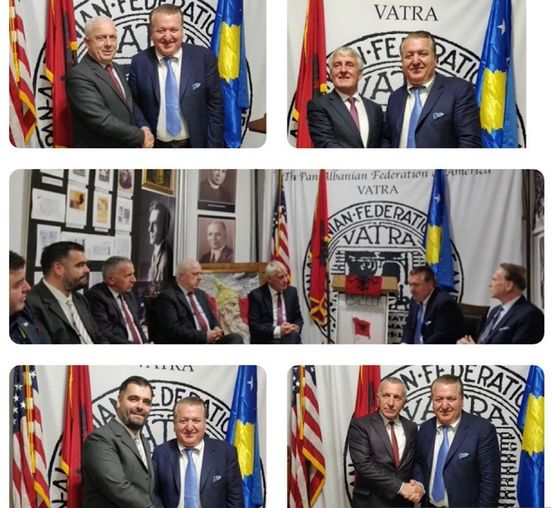
Rafaela Prifti/
Recognizing the urgency of the moment, Vatra President Elmi Berisha pledged full support and coordination in the framework of a nationwide strategy by the Pan-Albanian Federation of America Vatra.
“Acknowledging that there is momentum with regard to the rights of the Albanian population in the Presheva Valley is not enough now,” said members of the Presheva Valley delegation who were hosted at the headquarters of Vatra, the Pan-Albanian Federation of America, on Monday evening. In a series of meetings last week in Washington DC, the delegation is calling attention to the issue and urging for action.
Vatra President Elmi Berisha, who called the meeting “historic”, vowed that Presheva Valley is an integral part of “Vatra’s national strategy’ that is in full alignment with the US State Department policy as well as the home countries’. He drew comparisons between the current situation of Albanian population in municipalities of Southern Serbia with the campaign of terror by the Serbian state in Kosovo in the 90s.
“It is a matter of stability for the West Balkan region,” said Ragmi Mustafa, Chairman of the Albanian Democratic Party, “given that Presheva Valley sits at the borders of three states: Serbia, Kosovo and Northern Macedonia.” He is one of the four member group composed of: Shaip Kamberi, Member of Serbian Parliament and Chairman of the Party for Democratic Action, Nagip Arifi, Mayor of Bujanoc, Ragmi Mustafi, Chair of the National Albanian Council of the Presheva Valley.
Although they represent different political parties and organizations, at the meetings with the US officials as well as with Vatra leadership on Monday, all of them presented the situation of the Albanian population in the Presheva, Bujanoc and Medvegj municipalities as “very dire”. Ragmi Mustafa indicated that “especially, in the last two decades, these Albanian populated areas are being depleted at an alarming rate.” Due to depopulation campaigns and violations of minority rights by the Serbian state, he said “Albanians of Presheva are not allowed to participate in state-level offices, they get purged in the civil rolls and their records get erased impacting their ID cards, properties, landownership.”
While the issue of respecting the minority rights is included in “three agreements signed by the Serbian authorities as part of its aspirations to join the EU, there is no enforcing mechanism,” said Shaip Kamberi, Member of the Serbian Parliament and Chairman of the Party of Democratic Action. Faced with the reality of escalating violations of their rights by the Serbian government and the Brussels inability to enforce the agreements, the Albanian politicians of Presheva are asking that the issue of their rights be urgently included in the ongoing Kosovo-Serbia dialogue.
Since Kosovo independence in 2008, the EU-led dialogue has been largely unsuccessful with the majority of signed agreements not implemented. Serbia has vowed to never accept mutual recognition while increasing pressure for the Kosovo acceptance of the Association of Serb Municipalities, comprising the Serb-majority municipalities of Kosovo. The position of the Presheva delegation is that, in the same manner, the issue of the Albanian populated municipalities of Serbia should be included in the dialogue.
Faton Bislimi of the Albanian American Civic League, a lobbying arm of Albanians in Washington DC, said that the next couple of months are extremely important. He gave an overview of some high level meetings in the course of the visit following a previous round in June. Bislimi expressed gratitude for the support of Gabriel Escobar, Deputy Assistant Secretary, Bureau of European and Eurasian Affairs, James McGovern, Chair of the Rules Committee and members of the Congressional Albanian Caucus. Emphasizing the urgency and need for coordination, he said “[W]e are working towards a Congressional hearing on the issue,” with the aim of having an institutional basis here.
“The war in Ukraine factors in the current situation,” said Shaip Kamberi, “revealing how Serbia has tried to play the game of benefiting from Europe while doing Putin’s bidding.” The attention on the issue of the Presheva Valley is long overdue. “One way to address it is to bring it to the Kosovo Serbia dialogue,” said Ragmi Mustafi, Chairman of the National Albanian Council of Presheva Valley.
Feeling “hopeful” after the meetings in the US, members of the group see the current administration as the only solution for the plight of the Albanians in the Presheva Valley. Kosovo Bishop Rev. Dode Gjergji, who was a guest of honor at Vatra, placed emphasis “on the unity of minds and hearts.”
Recognizing the urgency of the moment, Vatra President Elmi Berisha pledged full support and coordination in the framework of a nationwide strategy by the Pan-Albanian Federation of America. Agim Rexha, Vatra’s Honorary President, Nazo Veliu, Secretary, Dr. Pashko Camaj, Executive Council member echoed the same message.